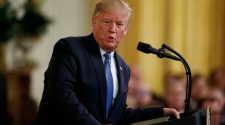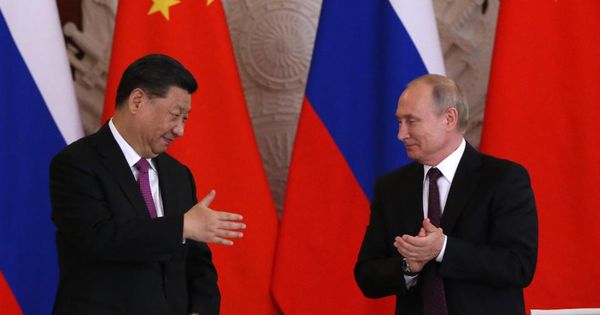Getty Images
In the world of authoritarian regimes, an alarming game of “keeping up with the Joneses,” or more accurately the Xis, is playing out as Russia’s President Vladimir Putin looks on with envy at China’s technological lockdown. November started with Russia’s Sovereign Internet Law mandating state surveillance hardware to be installed inside the country’s internet access points. Within a week, Putin had proposed replacing Wikipedia with a “more reliable” Russian version. At the same time, his parliament shaped a bill to force computers and smart devices to preinstall Russian tech. Both proposals were criticised for further restricting the online freedoms of Russia’s 150 million citizens. Wikipedia is already banned in China—as are services and applications from Western tech giants. If there is a template Putin wants to follow for Russia’s digital future, it isn’t difficult to figure out where it is coming from.
In June, Putin met China’s President Xi Jinping at the St Petersburg International Economic Forum to cement the strengthening “strategic relationship” between the two countries that represent the greatest threat to the U.S. and its allies. The leaders signed a joint statement announcing that “the China-Russian relationship has entered a new era, and is facing new opportunities for greater development.” According to China’s state media, “the objective of such a new kind of partnership is for both sides to give more support to each other as they seek to take their own development paths, preserve respective core interests, and protect sovereignty and territorial integrity.”
Putin used the event to take aim at Washington’s clampdown on China’s tech giants, specifically Huawei, but it could as easily have been Hikvision, Dahua or Huawei, SenseTime, Yitu or Megvii. He said of Trump’s campaign against Huawei that “in some circles, it is even called the first technological war of the coming digital era.” This was not a phrase used lightly. Huawei and other Chinese giants such as Tencent and Alibaba are investing heavily in Russia. Huawei is now the leading smartphone supplier into the country, with almost the same market share it enjoys in China, and the company has also secured a flagship role in the deployment of 5G.
The overt fighting over consumer tech makes for a slightly bizarre spectacle when it comes to the U.S., China and Russia. While we can debate back and forth the veracity of Huawei’s alleged links to Chinese military and intelligence agencies, there is no debate over state sponsored threat actors in China and Russia attacking U.S. government and commercial targets. There is no debate as to Russia engaging in multiple campaigns of election interference. And wherever there is a global hotspot—the Middle East, Eastern Europe, Korea, the South China Sea, there will be some level of face-off between the U.S. and one of China or Russia or both somewhere in the mix.
And this isn’t some form of parallel track. Behind the headlines and the PR driven media campaigns from China’s tech giants, there is an intensifying level of multi-dimensional cyber warfare taking place. Attacks on government and commercial targets, support for proxies and rogue states, abuses of social media platforms and the extraordinary reach they provide into every home and workplace in the West. The U.S. and key allies, notably the U.K. have now changed their tactics and structures to deal with a world where the cyber and physical domains have become interlinked and where disinformation battles across social and mainstream media take centre stage.
Putin claimed the replacement of Wikipedia with a Russian alternative would preserve Russian language and culture against a “war on the Russian language.” The president told a meeting of the Russian Language Council that “it’s better to replace it with the Big Russian new encyclopaedia in electronic form—reliable information, in a good modern form.” In other words, why let the truth get in the way of a good story.
Meanwhile, the Duma’s proposed bill to mandate the preinstallation of Russian software on devices sold in the country is intended to “provide domestic companies with legal mechanisms to promote their programs for Russian users.”
Both have nationalist aims, both have been presented as fending off threats to Russia’s way of life, both would push back on U.S. technical influence and its dominance of global standards and heterogenous software and services the world over. And both have been attacked for furthering the Kremlin’s levers of control over the internet.
This push back on U.S. influence, coming as part of an emerging Technology Cold War, is accompanied by military and industrial collaboration. There are complementary skills and the two countries are stronger in combination. In Xi and Putin, they also have two leaders prepared to adopt practical solutions, to seek out areas where they can engage, and to avoid those areas where they are too far apart. For the U.S. and its allies, this has frightening implications.
The relationship between China and Russia has ebbed and flowed over the years, but on the basis of “my enemy’s enemy” they have been pushed together. Economically, the two countries offer some level of hedge against sanctions and tariffs. Energy-wise, China consumes and Russia produces. On the security front, the U.S. and its allies cannot afford for the security and defense engagement between Russia and China to go too far. An understanding, some joint exercises, war games, all manageable. A fully fledged set of alliances in either the physical or cyber domains would be a disaster.
But in the meantime, there is an equally critical technological map emerging that will either see the U.S. cycle back on its restrictions on China’s champions and attempt to recover its international dominance. Or the split will push further, forcing those tech giants, led by Huawei, to start to replace some of those U.S. solutions. In Russia, those companies have a large and influential market to leverage. And a byproduct of that will be Putin taking advantage of China’s template for mass surveillance and control, for restrictions and technical suppression. Step by step, the threat of an Iron Cyber Curtain to match the Great Firewall will become more real.
For now, beyond giving Putin ideas on the art of the possible as regards technical restrictions, the wider security engagements between Russia and China remain more tactical than anything deeper. The “strategic partnership” should not be overplayed—that’s not yet the point of this story. The U.S. and its allies will hope it stays that way.















